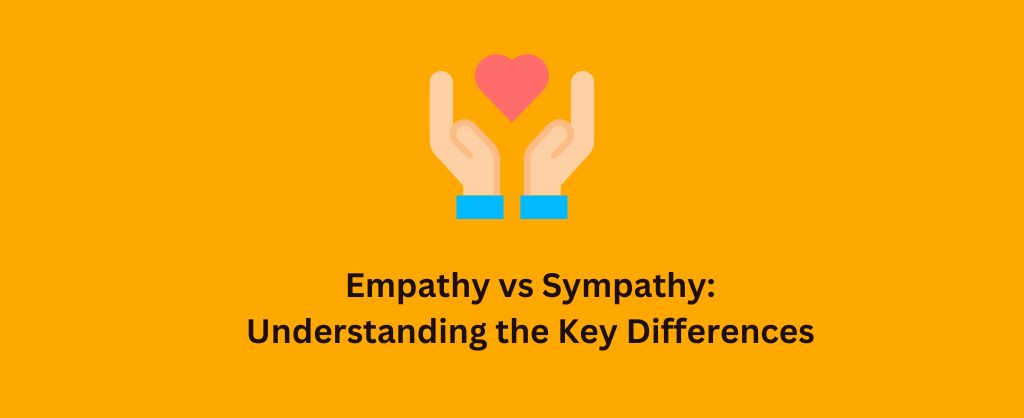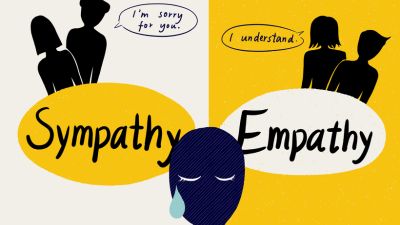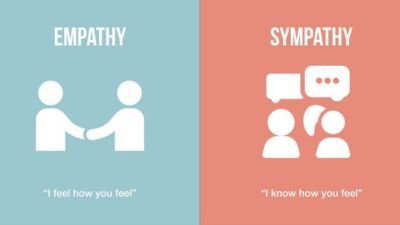The Subtle Differences Between Empathy & Sympathy Explained

Empathy and sympathy are two words that are often used interchangeably, but they actually have distinct meanings.
Knowing the differences between empathy and sympathy can help us better connect with and support others during difficult times.
In this article, we’ll explore the subtle but important differences between empathy and sympathy, with examples of each and tips on when to use one versus the other.
Difference Between Empathy and Sympathy
Empathy is the ability to understand and share the feelings of another person. It involves being able to put yourself in someone else’s shoes and experiencing things from their perspective. With empathy, you feel what they feel.
Sympathy, on the other hand, is feeling sorrow or concern for someone else’s suffering or misfortune. It does not involve sharing the same feelings as the other person. Rather, sympathy involves feeling care and compassion for them.
So in short:
- Empathy is feeling what another person feels
- Sympathy is feeling sorrow or concern for another person’s suffering
Empathy requires a deeper emotional connection and understanding of another’s experience. Sympathy is a more distant emotion of care and concern.
Examples of Empathy and Sympathy
Here are some examples that illustrate the differences between empathy and sympathy:
Empathy: John’s wife recently lost her mother. John says to his wife:
“I know how close you were with your mom. I can’t imagine how painful this must be for you. I’m here for you.”
In this example, John is striving to understand his wife’s painful emotions over the loss of her mother. He is trying to put himself in her shoes and share the grief she feels. This is empathizing.
Sympathy: James’s coworker just found out his dad has cancer. James says to his coworker:
“I’m so sorry to hear about your dad’s diagnosis. I’ll be keeping your family in my thoughts and prayers during this difficult time.”
Here, James is expressing care and well wishes for his coworker’s situation, but he can’t truly understand exactly what his coworker is going through. This is sympathy.
When to Use Empathy or Sympathy
There are certain situations where empathy is more appropriate than sympathy, and vice versa.
When to use empathy:
- When someone has gone through an experience similar to yours. Empathy comes more naturally when you can relate to the other person’s situation on a deeper level.
- When someone is opening up to you about challenging emotions they are feeling, like grief, heartbreak, or trauma. Responding with empathy allows them to feel truly heard and understood.
- When you want to build a deeper bond or connection with someone. Empathy helps us find common ground and relate human-to-human.
When to use sympathy:
- When someone is going through something that you have not experienced yourself. If you can’t tap into a shared emotional experience, sympathy lets you still convey care.
- When someone needs temporary emotional support, but not necessarily a deep sharing of emotions. Sympathy can offer quick compassion without needing to fully understand their experience.
- When you do not know the person well. Sympathy can be appropriate when connecting with acquaintances or strangers who are suffering, before you know them well enough to empathize.
How to Practice Empathy
Empathy takes intention, effort, and emotional energy.
Here are some tips for building your empathy skills:
- Listen fully. Give your complete attention when someone is sharing with you. Don’t interrupt or think ahead to your response. Truly listening is essential for understanding someone else’s perspective.
- Suspend judgment. We all have different backgrounds, values, and points of view. Refrain from judgment when listening to someone else’s experience, even if you don’t fully understand or agree with their perspective. An open mindset allows us to better empathize.
- Ask questions. Seek to gain deeper understanding of the other person’s emotions and point of view by asking thoughtful follow-up questions. Things like “What was that like for you?” or “How did that make you feel?” can build empathy.
- Connect through similarities. Think about times when you felt emotions similar to what the other person is feeling. Relating through shared experiences helps strengthen empathy.
- Acknowledge their feelings. Let the person know that you recognize the emotions they are experiencing. Comments like “It sounds like you’re feeling really sad” demonstrate empathy.
- Don’t over-identify. While finding common ground is helpful, be careful not to claim the other person’s experience as just like yours. Their perspective and emotions are still distinct.
Practicing these habits takes effort, but being able to empathize deeply with others is a gift – both for yourself and for nurturing your relationships.
Building Your Sympathy Skills
While empathy takes more effort, almost anyone can express basic sympathy for someone going through a hard time.
Here are some tips:
- Say it simply. Short statements like “I’m sorry this happened to you” or “My thoughts are with you” go a long way in voicing sympathy and care.
- Avoid saying “I understand.” Unless you’ve gone through something similar, avoid saying you understand. It’s more honest to stick with sympathy.
- Offer help. Ask if there’s anything you can do to help, even if it’s just a listening ear. Acts of service lets someone know you care.
- Send supportive gifts. Flowers, gift baskets, or cards are thoughtful physical symbols of sympathy and condolences when someone is grieving or unwell.
- Follow up. Continue to check in and express your sympathy over time after the initial support. Grief and struggles continue long after the first conversation.
While less emotionally involved than empathy, we should not underestimate the power of basic human kindness through sympathy. Even small gestures of care can make a big difference for someone going through hard times.
The Benefits of Balanced Empathy and Sympathy
We need both empathy and sympathy to build strong, caring relationships. While empathy enables deep connection and understanding between people who have shared experiences, sympathy allows us to still be present and supportive of those going through situations we cannot fully understand ourselves.
Here are some benefits of bringing balance to empathy and sympathy:
- We can support a wider range of people. Our capacity for empathy is limited by our personal experience. Sympathy expands our ability to be there for people whose lives may look very different.
- It avoids emotional fatigue. Empathy can take an emotional toll if we over-invest emotionally in experiences that are not our own. Sympathy allows us to still connect without becoming drained.
- It prevents projecting our own experiences. With sympathy, we don’t assume someone else’s situation is just like ours. We let their experience stand on its own.
- It creates space for more authentic relationships. Leading with empathy too soon can feel forced if a deeper connection isn’t already there. Sympathy gives relationships time to develop.
- It keeps us humble. Expressing sympathy reminds us that no one can fully understand another person’s distinct life experiences. We need both empathy and sympathy.
Learning when to sympathize, when to empathize, and how to balance the two will serve us well in navigating a wide range of relationships and supporting loved ones through life’s ups and downs.
Examples of Balancing Empathy and Sympathy
To understand how to blend empathy and sympathy effectively, here are two examples of offering balanced emotional support:
Supporting a grieving friend:
Karen’s friend Michelle is grieving after her brother passed away unexpectedly. Since Karen has never experienced the loss of a sibling, she can’t fully empathize with Michelle’s specific grief. However, Karen can:
- Offer heartfelt sympathy – “Michelle, I’m so very sorry for your loss. I can’t imagine how devastating this must be.”
- Sit with her in her grief without always trying to make her feel better. Be comfortable with silence and tears.
- Share memories of Michelle’s brother that make her smile, even if through tears.
- Avoid saying things like “I know exactly how you feel”, but connect through any shared experiences of grief Karen does have.
- Patiently continue offering sympathy and comfort over the long journey of grief.
Karen balances empathy and sympathy by meeting Michelle where she’s at without pretending to fully understand, while providing ongoing care and emotional support.
Supporting a stressed coworker:
James notices his coworker Eric seems anxious and on-edge for several days. Since James doesn’t know what’s causing Eric’s stress, he decides to lead with sympathy:
- “Hey Eric, you seem pretty stressed lately. Is everything okay?”
- “I’m sorry to see you’re going through a tough time. Let me know if you need anything or want to talk.”
As Eric opens up about problems in his marriage, James can then offer empathy where he relates, letting Eric know he’s not alone:
- “Relationships can be really hard. I remember when my wife and I fought a lot last year, I was stressed every day too. What you’re feeling makes total sense.”
- “It helped me to talk it through with someone I trusted. If you ever need to vent, I’m here.”
James starts by creating emotional safety through sympathy, then builds empathy once he better understands Eric’s experience.
He also is careful not to assume Eric’s marital issues are just like his own past struggles. A thoughtful balance makes Eric feel both cared for and truly understood.
Practicing Healthy Empathic Concern
While aiming for greater empathy is often beneficial, it’s important we don’t take empathy too far. Empathic concern is a balanced approach of caring for others while still maintaining emotional boundaries.
Signs you may be veering from empathic concern into unhealthy empathy:
- You feel emotionally drained after deep conversations where you have tried to feel everything the other person feels.
- You want to constantly vent your own emotions when listening to others.
- You feel responsible for solving the other person’s problems.
- You become so focused on supporting others you neglect your own self-care.
To build healthy empathy muscles:
- Reflect on how conversations impact your mental health. Notice when you feel depleted.
- Set aside time after deep talks with loved ones to re-center yourself with activities you enjoy.
- Remember that each person is ultimately responsible for managing their own emotions.
- Know your limits. You can still be caring while setting some boundaries around very traumatic shared emotions.
Empathic concern balances compassion for others with self-compassion – an important practice for emotional well-being.
Conclusion
Empathy and sympathy each play important roles in how we care for one another during difficult times. While often confused, they are distinct emotional experiences:
- Empathy involves deeply connecting with what another person feels, almost as if we feel it ourselves.
- Sympathy is a caring external perspective on someone else’s suffering.
Knowing when to offer the gift of empathy, when sympathy is more appropriate, and how to balance the two with empathic concern leads to healthier relationships.
We all need fellow humans who can walk with us through life’s joys and pains – sometimes with empathy, sometimes sympathy, and ideally a meaningful blend of both.












